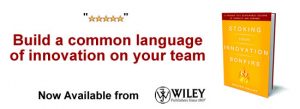Innovation Flow – personal mastery explored
 Mastery, unconscious competence, effortless genius.  These are all ways to describe what Mihaly Csikszentmihalyi called the state of ‘flow’.  At a personal level, innovation excellence relies on our ability to master the state of effortless genius.  What can we learn about ‘flow’ from music that we can transfer to the world of innovation and personal excellence?
Mastery, unconscious competence, effortless genius.  These are all ways to describe what Mihaly Csikszentmihalyi called the state of ‘flow’.  At a personal level, innovation excellence relies on our ability to master the state of effortless genius.  What can we learn about ‘flow’ from music that we can transfer to the world of innovation and personal excellence?
Let’s begin, not by talking about the state of flow but by experiencing it through looking at masters of their craft operating at a state of effortless genius. Let’s start with jazz master Joe Pass:
What then is flow? Are there any ways to learn how to be in this state and what can we learn from professional musicians?
John Howitt is a professional session musician, who works for the BBC, writes film soundtrack music and has performed with Celine Dion, Anastasia and Shirley Bassey. He also works with me in our business and music masterclasses.  As a session musician, John must be at peak performance with every engagement. I interviewed him to reveal some of his tips for staying in the flow:

John and Peter pictured just before giving a "Myths and Riffs of Innovation" masterclass - Picture courtesy of Jason Dodd Photography www.jasondoddphotography.com
Peter : Â Can you tell us something about your career and the role of practice as a spur to personal mastery?
John : “Mastery comes out of preparation. In business circles, people talk of the need for 10 000 hours disciplined practice to master an art or discipline.  Contrary to what amateur musicians might think, to do what I do, it’s all about practice and preparation. I have probably exceeded the 10 000 hours in my career as a session musician and still spend 5 hours a day playing an instrument if I am not actually engaged in a piece of client workâ€
Peter : Â Many so-called ‘creatives’ say that they feel they would lose their creativity / mojo if they overprepared. What do you say to that?
John : “Practice gives you ease AND versatility. Playing routine pieces of music almost goes on auto pilot allowing you to concentrate on what is needed to add that extra piece of sparkle. I feel this is just as applicable to business and personal excellence as it is to performing musicâ€
Peter : As well as your stage and session work, I know you also record soundtrack music for films. Â In your experience, how do you move from a performance role to one that is perhaps more introverted?
John : Â In one way, there is no difference. Â When performing, you still need to keep your focus both internally on the mastery of what you are doing, whilst keeping your antennae open to hear those around you. Â It’s what the business gurus called ’emotional intelligence’ – living inside your own head AND paying attention to your co-performers. Â Good musicians and leader do both. Â Bad musicians and leaders just listen to themselves.
That said, when I’m recording soundtracks, I can focus completely in on the point of detail that I’m working with, PLUS keep in mind the overall piece. Â The big picture AND the small detail are essential if you are to achieve what Peter Senge calls personal mastery. Â As a musician or leader, I find it essential to be both gregarious AND solitary.
Peter : On innovation excellence, can you share one important insight for us?
John : I’ll offer two. Â In music, the innovation challenge lies in breaking away from habits. Practice can force you into habit but it need not. Â It’s what companies like Toyota, Nokia and First Direct have achieved, rather than just repeating themselves. Â Furthermore, it’s like Miles Davis says “There are no mistakes”
Please share your thoughts on what gets you in the innovation zone.   To finish, let’s see some masters of music immersed in the art of effortless genius. None other than Jeff Beck giving a tribute to Les Paul, plus the original.
Three innovation excellence lessons arising from this:
- Practice and discipline is part of the personal mastery that leads to innovation. Â Read back to the Deep Purple article to see more on this aspect.
- Deep level practice can lead to an ability to innovate through being able to escape tramline thinking. Â Equally, it can be a trap.
- Mistakes are part of the innovation game. Â It’s what you do with them that counts.
image credit: musicinternational.com

Don’t miss an article (4,000+) – Subscribe to our RSS feed and join our Innovation Excellence group!
Peter Cook is Rock’n’Roll Innovation Editor at Innovation Excellence.  He leads Human Dynamics and The Academy or Rock, and provides Keynote speaking, Organisation Development and Business Coaching.   www.humdyn.co.uk and www.academy-of-rock.co.uk.  You can follow him on twitter @Academyofrock
NEVER MISS ANOTHER NEWSLETTER!
LATEST BLOGS
What happened to smart advertising?
For a television advertisement to be effective, do you need to lay out everything for the viewer and make it obvious? Or, is an advertisement more memorable if you let the viewer connect the dots themselves? Here are two examples of television advertisements that promote the product in a slightly more intellectual/emotional way that promotes engagement and curiousity:
Read MoreInvention versus Innovation
Continuous innovation requires that innovation is placed at the center of the organization and that all parts of the organization are changed to support it. To effectively place innovation at the center of the organization, people must know what innovation is, what it looks like in their organization, and how they can contribute. Most people easily confuse invention with innovation, and wrongly chase invention in the name of innovation.
Read More



